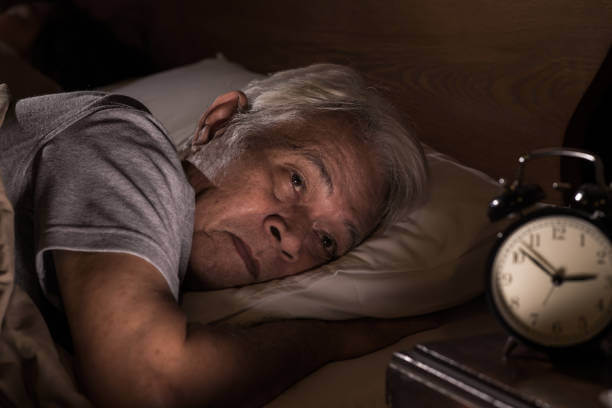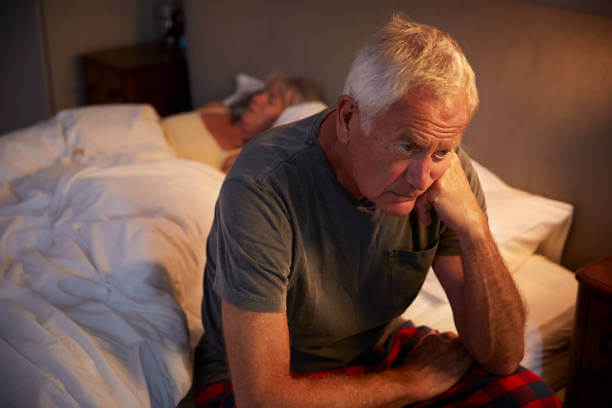Insomnia in the elderly has not been the object of doctors’ attention for a long time, although the number of complaints about sleep disorders and an increase in the intake of sleeping pills among the elderly is constantly growing. According to the studies, approximately 35% of people over 60 are diagnosed with insomnia, while 25% of men and 50% report dissatisfaction with the quality of sleep. About 25% of older adults use sleeping pills.
It is possible to diagnose insomnia in the elderly if there are complaints about the following symptoms:
Difficulties with falling asleep;
Shallow and restless sleep, awakening from the slightest sounds;
Waking up at night with the inability to get back to sleep;
Nightmares, fear of falling asleep;
Complaints about the lack of proper rest during sleep.

Causes of insomnia in the elderly
Sleep disorders in older adults are, as a rule, caused by several factors. All causes of sleep disorders can be divided into primary and secondary.
Primary causes:
Sleep apnea syndrome;
Myoclonus;
Sleep hygiene disorder.
Secondary causes:
Neurological diseases;
Cardiovascular pathologies;
Lung diseases;
Pain syndromes of various localization;
Oncological diseases;
Disorders of the endocrine system;
Violation of metabolic processes in the body;
Anxiety and depressive disorders;
Strong emotional experience or shock.
As you can see, the causes of insomnia in the elderly may vary, but often it’s a mix of different ones.
Insomnia types throughout the older adults
Transient insomnia is caused by intense, stressful conditions such as hospital treatment, surgical procedures, the death of a loved one, or retirement. This undesirable situation typically resolves by itself in about a week.
Chronic insomnia. If the person has insomnia due to age-related shifts, health conditions, or other circumstances for a month or more, it can be a symptom of chronic insomnia.
One-third of chronic insomniacs can be affected by mental illnesses. Anxiety, nervousness, exhaustion, and cognitive impairment are the most common problems of sleep disturbances in aged people. Also, it can be challenging to diagnose and help patients taking meds for a long time due to their side effects. Some seniors may experience sleep apnea, defined by the total or partial stoppage of breathing for more than 10 seconds. This is one of the reasons for sleep illnesses in the aged due to regular awakening. What is more, sleep can be disrupted by poor daily habits, late meals, inadequate physical activity, and excessive coffee and alcohol intake.
Diagnosis of insomnia in the elderly
Diagnosis of insomnia in the elderly starts with an inquiry into the patient’s medical history. It helps explore potential causes of sleep disorders, as well as to develop a treatment strategy. Considering the age, the doctor gives a complete and detailed assessment of the patient’s condition, if necessary, involving other specialists — neurologists, cardiologists, oncologists, etc. After diagnosis, treatment is prescribed.

Tips for normalizing sleep
There are many different techniques to manage insomnia in old age. In the case of sleep disorders, bodily functions worsen, and chronic conditions develop. On the other hand, the lack of sleep may also contribute to and negatively affect health conditions. Therefore, it is necessary to contact a good specialist and normalize sleep. Here is also what you may try:
Use sleeping apps. Recently, technology companies have been paying more and more attention to health and sleep quality. Many apps aim to help people get a better night’s rest.
Journey: Sleep Insomnia Helper helps ease insomnia in the elderly and uses the CBT-I method. It provides a media gallery of sleep sounds, sleep stories recorded by professionals, and relaxing melodies. There is also a personal sleep coach and a 4-week CBT program for sleep. You may download it and take a free trial.
Avoid alcohol and caffeine-rich drinks before going to bed. Regular use of strong drinks adversely affects the stages of sleep.
Do not use medications without the recommendation of a doctor. Try not to overeat and eat late; the last meal should be at least 2.5 hours before bedtime.
Don’t force yourself to sleep if you’re not sleepy or tired. It is better to distract yourself with pleasant music, reading, or relaxing activities to drive away thoughts.
Treatment of insomnia in the elderly
Depending on the cause of insomnia in seniors, the treatment plan may include:
Improvements in sleep hygiene (falling asleep and waking up at the same time, limiting daytime sleep, keeping the optimal temperature in the room, avoiding food in bed, etc.);
Psychotherapy;
Medications (antidepressants, sleeping pills);
Treatment of the underlying disease that led to insomnia.
If it’s transient insomnia caused by a stressful situation, treatment mainly includes psychotherapy. If it’s chronic insomnia lasting more than a month, psychotherapy may be combined with drug treatment. Note that due to age-related changes in the body, treatment of insomnia in the elderly is prescribed with great caution — not all drugs for depression, anxiety, or sleep disorders are prescribed to adults aged over 60.
Prevention of insomnia among the older adults
It is important to remember that it’s much easier to prevent insomnia in older adults than treat a chronic one. Prevention includes various methods:
Individual and family psychotherapy;
Consultations with healthcare specialists regarding age-related sleep changes;
Following a treatment plan for the underlying disease (neurological or somatic);
Sleep hygiene training.
Conclusions
It is worth remembering that each case is strongly individual and has to be investigated individually as well. It is very important to understand what is the cause of sleep disorders. After all, it may even depend on which doctor will need to be observed in the future: a therapist, a neurologist, a psychotherapist, or a sonologist. Accordingly, the treatment regimen for insomnia will be different. Therefore, do not postpone a visit to a doctor for a consultation and use all the recommendations above. This will help you to cure sleep and always stay cheerful and healthy.
















